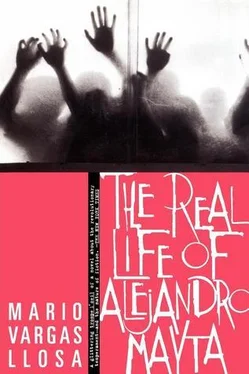“A little farther is the new town where I live,” he says. “I walk here to take the bus. Will you remember how to get back after you let me off?”
I assure him I will. I’d like to ask him how much he makes at the ice-cream parlor, how much of it he spends on the bus, and how he uses what’s left. Also, if he’s tried to get any other work, and if he’d like me to try to help, give him a recommendation. But all my questions wither before I can get them out.
“At one time, people said there were possibilities in the jungle,” I hear him say. “I was thinking that over, too. Since it would be hard to leave the country, maybe I should go to Pucallpa, to Iquitos. They said there were lumber camps, oil wells, job possibilities. But it was a lie. Things in the jungle are the same as they are here. In this new town, there are people who’ve come back from Pucallpa. It’s all the same. Only the cocaine dealers have work.”
Now we’re leaving the open country and in the darkness I can make out an agglomeration of low and tenuous shadows: the shacks. Made of adobe, corrugated sheet metal, boards, and straw matting, they give the impression of being half finished, interrupted just as they were taking shape. There is no pavement, no sidewalks, no electricity, probably no water or drains either.
“I’ve never been out here,” I tell him. “It’s huge.”
“Over on the left, you can see the lights of Lurigancho,” Mayta says as he guides me through the maze of the slum. “My wife was one of the founders of this new town. Eight years ago. Some two hundred families started it. They came at night in small groups, without being seen. They worked till dawn, nailing boards together, hauling rope. The next day, when the guards came, the place already existed. There was no way to get them out.”
“So, when you got out of Lurigancho, you didn’t know where you lived?” I ask him.
He says no with a shake of his head. And he tells me that the day he got out, after almost eleven years, he came alone, walking through the open country we’ve just crossed. Throwing stones at the dogs that tried to bite him. When he got to the first shacks, he began to ask, “Where does Mrs. Mayta live?” And so he reached home and gave his family the surprise of their life.
We’re right in front of his house. I have it in my headlights. The facade is brick, and the side walls too, but the roof hasn’t been finished yet. It’s corrugated sheet metal, not even nailed to the house, but held in place by piles of stones set at regular intervals. The door is a board held to the wall with nails and rope.
“We’re fighting to get water,” Mayta says. “That’s our biggest problem here. That and garbage, of course. You sure you can find your way back to the street?”
I assure him I can, and I say that, if he doesn’t mind, I’ll get back to him soon and we’ll talk some more and he can tell me more about Jauja. Maybe he’ll remember more details. He nods, and we say goodbye, shaking hands.
I have no trouble getting out to the road that goes to Zárate. I drive slowly, stopping to take note of the poverty, the ugliness, the abandon, and the despair of this new town. I don’t even know its name. No one’s on the street, not even an animal. On all sides, there are mounds of garbage. The people, I suppose, just throw it out of their houses, resigned, knowing that no city garbage truck is ever going to pick it up, lacking the spirit to join together with other neighbors to carry it farther away, to the open country, or to bury or burn it. They, too, have thrown in the towel. I imagine what daylight would reveal: neighborhood kids playing on pyramids of filth, swarming with flies, roaches, rats, vermin of all kinds. I think about the epidemics, the stench, the premature deaths.
I’m still thinking about the garbage in Mayta’s slum when on the left I see Lurigancho in the distance and I remember the mad, naked inmate sleeping on the immense garbage heap in front of the odd-numbered cell blocks. And shortly afterward, when I am all the way across Zárate and the Plaza de Acho and I’m on Avenida Abancay, on the road that takes me to Vía Expresa, San Isidro, Miraflores, and Barranco, I can already imagine the seawalls in the neighborhood where I have the good fortune to live, and the garbage you see — I’ll see it myself tomorrow when I go running — if you crane your neck and peek over the edge. The garbage dump that the cliffs facing the sea have become. And I’ll remember that a year ago I began to concoct this story the same way I’m ending it, by speaking about the garbage that’s invading every neighborhood in the capital of Peru.












